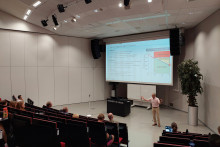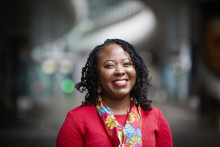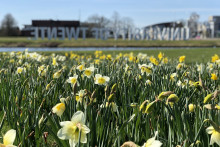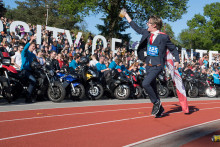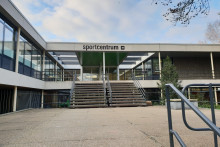Executive Board Vice President Machteld Roos kicked off the meeting. Not from the Waaier, but from Lausanne in Switzerland. 'Yes, by train', she said. 'And I will also travel back by train.' Referring to the recently presented 'train zone map' and stating the importance of sustainability for the UT ('we already do a lot, but can do even more'), she introduced the subject of CO2 compensation for air travel. Her ponderings: 'Who decides who flies when? And should we nudge, penalise, reward or promote? And what about the undesirable side effects of introducing a compensation system?'
Then it was time for ITC professor Maarten van Aalst to speak, who was involved in drawing up the recent IPCC climate reports. He went through the alarming consequences of climate change in a down-to-earth and fast-paced manner: heat waves, floods and water shortages, the deterioration of coral reefs and biodiversity, food security and human wellbeing. 'All these things are becoming increasingly unmanageable. We have no time to lose.' 'But', he pointed to the audience present, 'I also know: I'm preaching to the converted here.'
Bad habit
One such converted was the next speaker, Jurriaan Schmitz, Professor of Semiconductor Components at the Faculty of EEMCS. He showed a photo from 2015, when the then UT Executive Board flew off to South Africa with a heavy delegation to sign a cooperation agreement with Germany's Fraunhofer Institute. But he also pointed to his own flying behaviour a year later. In 2016, he visited conferences in Japan, South Korea and South Africa. His wry conclusion about the flying behaviour of the UT community: 'If the entire world population flew as much as we do, the planet would be in even worse shape.'
Above all, Schmitz questioned the net benefit of visiting international conferences. According to him, the advantages (visiting beautiful places, meeting interesting people and the boss/tax payer pays) do not outweigh the disadvantages (the environment, the cost to the tax payer, pressure on social life). He has come to see flying as a bad habit. Since 2016, Schmitz has not flown intercontinental flights, and since 2019 he has not flown at all. He attends fewer conferences and if he does, he looks for it closer to home or participates online. With the important remark that there are so many conferences organised in his field that he is in a privileged position.
Not far enough away
Professor Frieder Mugele then went on to explain the three scenarios for compensating for air travel: a flat rate per flight made, a progressive model in which frequent flyers pay relatively more and the calculation (and payment) of the actual emissions per flight. Mugele also explained the possibilities for a sustainability fund.
After Mugele, it was up to the audience present to give their opinions. Soon, several fingers were up in the air. Judging by the reactions from the audience, a striking resemblance was that the proposed scenarios do not go far enough. As a university, we should be leading by example, not lagging by example', said assistant professor Guus Dix. A student who was present asked why stricter goals could not already be set for 2030. Another wanted more ambitious targets for commuting too.
These views were also reflected in the voting behaviour; the audience could give their opinion on the compensation scenarios, what a sustainability fund could be used for and whether there should be CO2 budgets. Two thirds of those present were in favour of a strict budget for business flights. Some 65 per cent had a clear preference for scenario 3 - actually calculating the CO2 emissions per flight and compensating them. There was more division over how the money should be spent: compensating for the costs of extra train journeys, making the UT organisation more sustainable, or putting the money into external sustainability projects could all count on support. Option 4, 'a combination of all of the above', therefore also enjoyed widespread support.
Grim reality
It should therefore come as no surprise that the public discussion raged on during the voting and that the session overran by a considerable length of time. The many snags and catches - also concerning the fairness of CO2 compensation - became increasingly clear. One postdoc who was present expressed concern about the career paths of young academics, if the UT were to discourage travelling to conferences. And someone from the UT Travel Unit pointed out the grim reality. 'For two years, our work was virtually at a standstill. But now we see an explosion in the air travel numbers. People find train journeys too expensive, or booking them is too cumbersome via badly constructed websites. What's more, we know from experience that there are people who like to save frequent flyer points with business trips, in order to then be able to fly cheaply in private.'
Enough food for thought for the initiators of the SEE programme, who were mainly looking for a broad base of support with this consultation session - and found a room full of supporters and climate adepts. They will incorporate the results in a plan, on which the Executive Board will have to make a decision. Perhaps the most telling conclusion from the audience was: 'We have to do much, much more, but at least this is a start.'


